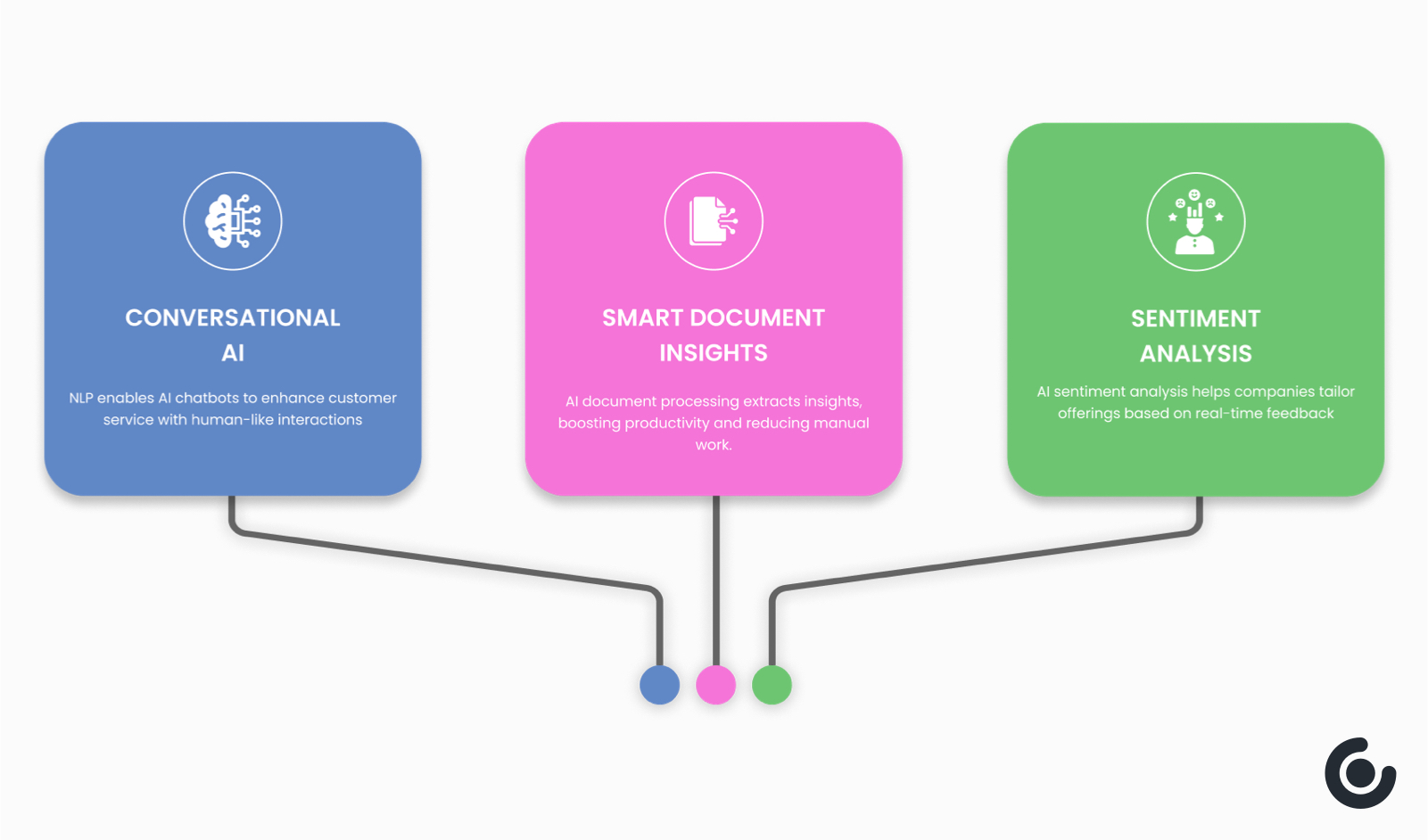Unlock the Power of AI to Transform Your Business

Table of Contents
Artificial intelligence (AI) is revolutionizing business intelligence (BI), unlocking new capabilities and driving innovation across industries. By leveraging expertise from an AI service company, organizations can enhance data-driven decision-making, streamline operations, and foster a culture of collaboration. Here’s a comprehensive look at the top trends redefining the future of BI and empowering businesses to thrive in an increasingly competitive landscape. Discover how IndiaNIC, a leading Artificial Intelligence development company in India, can support your technological journey with its machine learning development and AI and ML services.
Transforming Business Intelligence with AI
Predictive Insights
Artificial Intelligence – powered analytics provide real-time predictions and recommendations, allowing businesses to anticipate market shifts and make confident, data-driven decisions. By analyzing historical and current data, AI enables accurate forecasts, which helps organizations identify risks, optimize resources, and proactively adjust strategies.
Expanded Example: Retail companies use predictive analytics to forecast demand patterns and optimize inventory, improving the customer experience by ensuring product availability and reducing waste. AI-driven forecasts allow personalized marketing, enhancing customer engagement with targeted campaigns.
Customized Solutions for Unique Business Needs
For AI to deliver real impact, solutions must be tailored to each organization’s unique needs. IndiaNIC offers customized AI solutions that align with specific business requirements, whether it’s creating AI-driven customer insights for retail, predictive maintenance for manufacturing, or autonomous decision-making in finance. Tailored AI solutions help organizations overcome unique challenges, drive innovation, and gain a competitive edge.
Expanded Example: For healthcare providers, customized AI solutions streamline patient care by leveraging predictive analytics to foresee health risks and automate documentation processes. In manufacturing, AI solutions enhance productivity by predicting machine maintenance needs, reducing downtime, and enabling efficient resource allocation.
Automated Workflows
Intelligent algorithms automate routine tasks, allowing employees to focus on strategic initiatives. AI integration into workflows optimizes repetitive processes, accelerates decision-making, and reduces operational costs.
Expanded Example: In manufacturing, AI-powered systems monitor machinery health in real-time, identifying potential failures before they happen. This proactive maintenance approach reduces downtime and enhances productivity. Additionally, automated workflows streamline administrative tasks, minimizing human error and increasing overall efficiency.
Autonomous Decision-Making
Advanced AI systems make independent decisions based on real-time data, minimizing the need for human intervention and enabling rapid responses to dynamic conditions.
Expanded Example: E-commerce platforms use autonomous decision-making to adjust prices dynamically in response to demand, competitor prices, and customer behavior, optimizing revenue. Autonomous AI systems also personalize recommendations, boosting customer satisfaction and sales conversion rates.
Advancements in Natural Language Processing (NLP)
Conversational AI
NLP advancements empower AI to understand and respond in natural language, transforming customer service with AI-driven chatbots and virtual assistants that improve user interactions by providing real-time responses and personalized experiences.
Expanded Example: Financial institutions use NLP in chatbots to assist with inquiries and automate loan processing. NLP also plays a critical role in extracting essential information from contracts, ensuring compliance, reducing human oversight, and improving response times in customer-facing roles.
Intelligent Document Processing
AI-powered document processing extracts insights from unstructured data sources such as emails and contracts, improving productivity and minimizing manual work. It increases data accuracy, speeds up processing time, and ensures critical information is captured efficiently.
Sentiment Analysis
AI-based sentiment analysis enables businesses to understand customer preferences and respond to real-time audience feedback. With sentiment insights, companies can fine-tune their offerings, making strategic decisions that align with customer needs and enhance brand loyalty.
Responsible AI: Mitigating Bias and Ethical Concerns
Transparency and Explainability
Ensuring transparency in AI systems is crucial for ethical decision-making, especially in industries like finance and healthcare. Organizations are prioritizing explainable AI to maintain user trust and guarantee that AI-driven insights are clear and actionable.
Expanded Example: Financial institutions use explainable AI for credit scoring, ensuring applicants understand decisions. This builds transparency and trust, leading to fairer and more ethical practices in AI applications.
Bias Mitigation
Mitigating algorithmic biases is essential for fair AI use, especially in diverse applications like hiring, lending, and healthcare. Companies are developing bias detection frameworks to reduce algorithmic bias and ensure their AI systems serve all users fairly.
The Human-AI Collaboration Revolution
Augmented Intelligence: Combining Human and AI Strengths
AI complements human skills by providing analytical capabilities, which drives productivity and innovation. Businesses benefit from AI’s speed and precision alongside human creativity and strategic thinking.
Expanded Example: Marketing teams can use AI to track customer sentiment and trends across social media, refining campaigns and enhancing customer engagement through timely adjustments. AI can also analyze campaign performance in real-time, offering immediate feedback for strategy optimization.
Scaling AI Across the Enterprise
Enterprise-Wide AI Adoption
Organizations are adopting AI throughout the business to enable consistent, data-driven decisions across departments.
Expanded Example: Healthcare organizations have established AI Centers of Excellence to ensure consistent practices across facilities, helping improve patient care and streamline operations.
Centralized AI Governance
AI governance frameworks are vital to ensure data use compliance, ethical AI practices, and transparency. Companies are implementing standardized processes and controls to maintain AI integrity and trustworthiness as they scale.
Preparing for the AI-Driven Business Landscape
- Assess Current AI Readiness: Evaluate infrastructure, talent, and technology readiness for AI.
- Develop a Roadmap: Outline strategies for AI integration with specific success metrics.
- Invest in Talent and Upskilling: Build an AI-savvy workforce through targeted training.
Key Takeaways
- Predictive Insights: AI helps businesses make better, data-driven decisions.
- Automated Workflows: Intelligent algorithms free up resources and improve productivity.
- Transparency and Ethics: Responsible AI practices are essential for user trust.
- Scalable AI Adoption: A structured approach to scaling AI ensures consistent success.
- Human-AI Collaboration: AI augments human capabilities, leading to innovation and efficiency.
Conclusion: Embracing the AI-Powered Future
The transformative potential of Artificial Intelligence (AI) is reshaping business success across sectors. By embracing predictive analytics, automated workflows, and responsible governance, organizations position themselves at the forefront of an evolving landscape. The future of business intelligence is here—and it’s powered by Artificial Intelligence service companies like IndiaNIC, your partner in Generative AI Solutions, and more.
FAQs
What are some quick wins for implementing AI in a business?
Predictive analytics for demand forecasting, automated customer support with chatbots, and real-time analytics dashboards for faster insights are quick wins that deliver immediate value.
How can AI-driven automation improve operations?
AI automation can handle repetitive tasks, reduce errors, and speed up decision-making, which results in cost savings, efficiency improvements, and more strategic focus for employees.
Why is responsible AI important?
Responsible AI ensures transparency, fairness, and trust, helping businesses use AI in ways that are ethical, reduce biases, and build user trust.
How do companies ensure ethical AI use?
Many organizations implement AI governance frameworks to monitor biases, maintain transparency, and set guidelines for ethical AI practices.
How can businesses upskill their teams for AI?
Investing in AI training programs, partnering with educational institutions, and implementing ongoing learning opportunities within the organization can build a strong, AI-literate workforce.




